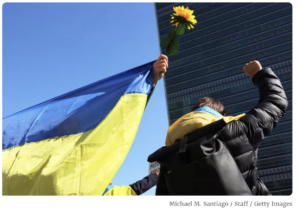“Over the last week or two, many of us will have been watching events in the news with a mixture of shock and horror, especially those of us from – or with friends and family from – the affected areas. Even without a direct personal connection to the conflict, it’s natural that seeing all the footage coming out of Ukraine, whether on the news or on social media, can be distressing. It’s important to recognise this, even if we are committed to paying attention, showing solidarity, or seeking to help the victims. It can be particularly hard to know how to talk to your child about what’s going on. – Young Minds

In recent times, news reports are becoming increasingly filled with the bleak information of events around the world. This information is difficult to read and talk about for everyone, but in particular there comes a challenge when children and young people start to ask questions.
It is the aim for this section of the Healthier Minds website to be updated with links and resources to help parents, carers, educators, children, and young people to speak about war and conflict, including events in Ukraine and Gaza/Israel and support their own and others’ mental wellbeing.
The first page ‘Understanding and Supporting our Refugee Children’ aims to provide advice to those who might be supporting refugee children, including a webinar recording from Dr. Tina Rae.
The second page ‘Advice for Talking about war and conflict’ contains advice on ways to discuss war and conflict with children and young people.
The fourth page ‘”It’s ok to be worried about war and conflict”- Resource Packs’ provides links to a range of resource packs created by NHS Grampian. There are booklets for children under 12, teenagers, children and young people with autism, and parents/carers which provide information on the topic of war, relaxation exercises, tips on protecting your wellbeing online, and a range of supportive websites.
The fifth page ‘Support for Educators’ contains resources and advice for educators to help support children and young people with their health and wellbeing in relation to conflict and war.
The sixth page ‘Posters‘ contains links to poster resources that can be used around schools to welcome refugee children.

